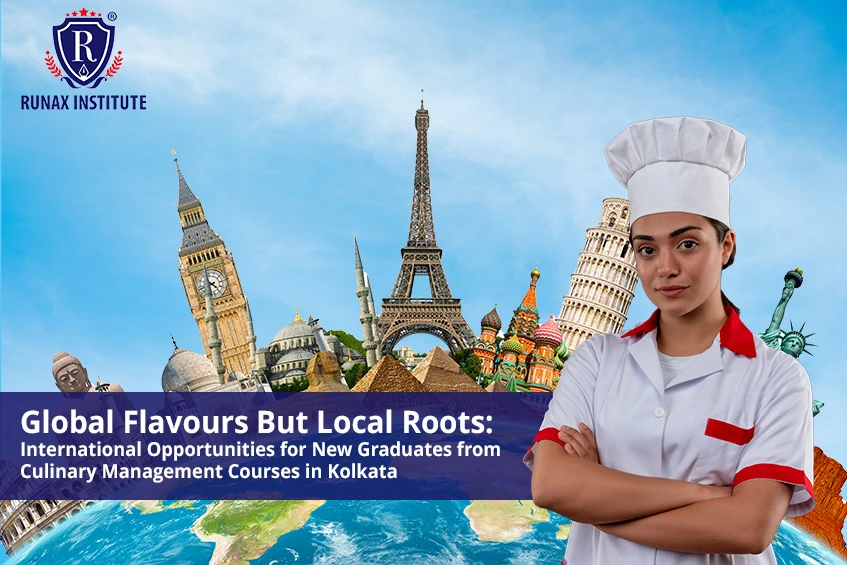Let’s be honest—learning to cook in Kolkata is like learning music in Vienna. The city’s food legacy is rich, chaotic, and constantly evolving. But here’s the thing: if you’re training in the best culinary management course in Kolkata, your journey doesn’t end at the kitchen door of a five-star hotel in Park Street. The international food industry is craving new flavours, fresh talent, and chefs who understand both global culinary trends and regional authenticity.
This guide unpacks how a Kolkata-based culinary degree can take you from rolling luchis to rolling with global chefs. We explore how top institutions blend Indian culinary heritage with global techniques to create professionals ready for international kitchens, cruise liners, Michelin-starred restaurants, and even culinary entrepreneurship.
Introduction: Kolkata’s Culinary Industry
Kolkata is a food city in every sense. From street food to colonial club cuisines, the city is a melting pot of Anglo-Indian, Mughlai, Chinese, and Bengali culinary traditions. This diversity makes it the perfect playground for mastering the basics while learning to improvise.
Top reputed hotel management institutes such as the Runax Institute of Hotel Management and the Indian Institute of Hotel Management (IndianIHM) understand this deeply. Their programs are rooted in India’s vibrant food culture but are designed to meet international demands. They combine classroom instruction with hands-on training to provide a strong foundation in culinary arts education.
The curriculum isn’t just about chopping onions and flambéing steaks. It includes modules on international culinary certifications, hospitality management courses, and global gastronomy programs. Students also gain exposure to culinary innovation workshops, preparing them for complex, cross-border challenges.
Curriculum: Blending Tradition with Innovation
Kolkata’s culinary education isn’t a one-size-fits-all recipe. It’s a fine blend of rich Indian traditions and global flair. At the heart of the culinary management course, you’ll find a balance that marries classic Indian cooking methods with the techniques demanded by international kitchens. Students dive into traditional Indian techniques like dum pukht, tandoori grilling, and bhuna while simultaneously mastering world cuisine training such as Italian, French, Mediterranean, and East Asian dishes.
Beyond the stove, the courses are built to be multi-dimensional. Modules include hospitality management courses, where students grasp the business side of food, from inventory systems and cost control to customer service. They also study international culinary certifications, equipping them with globally recognised credentials.
Training in restaurant management, culinary entrepreneurship, and culinary innovation workshops ensures students can think beyond the apron. Whether they plan to run a kitchen or launch their cloud kitchen, these tools are essential. Digital components are equally crucial. Students explore hospitality technology integration, learning how to manage POS systems, kitchen automation, and delivery app integration.
Finally, networking is baked into the curriculum. With exposure to culinary arts networking events and cross-campus collaborations, students meet peers, mentors, and professionals who expand their global footprint. This isn’t just about cooking—it’s about understanding the evolving culinary landscape and thriving in it.
International Internships and Placements
The road from Kolkata’s kitchens to global culinary capitals is wide open—and well-paved by some of the city’s top institutes. Many colleges that offer the best culinary management courses in Kolkata partner with renowned international hotels, restaurants, and global culinary institutes to facilitate immersive international culinary internships. These programs send students to culinary hubs like the USA, Australia, France, Singapore, and the UK, where they get to work with top-tier chefs and multicultural kitchen brigades.
This hands-on global experience is far more than a fancy addition to a résumé. It builds professional discipline, develops cross-cultural culinary skills, and offers a deep understanding of hospitality management courses in different cultures. Students learn the practicalities of international kitchen management, from sourcing ingredients to maintaining consistency across menus for international guests.
Many institutions, such as the Runax Institute of Hotel Management, provide global chef placements with a strong track record of 100% job placement assistance, even before course completion. These placements often come with the chance to earn international culinary certifications, ensuring students graduate with both the skills and credibility to enter elite culinary environments.
Through these culinary exchange programs, students return with broadened palates, sharper technical skills, and a better grasp of global hospitality expectations. Simply put, these internships transform them from regional culinary students into globally employable professionals ready to thrive in competitive culinary settings.
Participation in Global Competitions
Before a chef dons the toque in a professional kitchen, they often sharpen their knives on the competition stage. Culinary contests aren’t just battles for medals—they’re dynamic training grounds for future stars. Participating in international events nurtures resilience, sharpens time management, and builds culinary precision under pressure.
Culinary students in Kolkata benefit from access to some of the world’s most prestigious culinary events. The city proudly hosts the Young Chef Olympiad, an internationally acclaimed competition that draws aspiring chefs from over 50 countries. This isn’t just a cooking challenge—it’s a career catalyst. By testing their mettle on global platforms, students refine their craft and gain recognition beyond borders.
Participation in these global culinary competitions boosts technical skills, presentation finesse, and culinary creativity. They also provide rich opportunities for culinary arts networking. Students connect with mentors, international judges, and potential recruiters from five-star hotels and global restaurant chains. These connections often translate into job offers or invitations to international culinary internships.
In addition to YCO, students often attend and contribute to international food festivals, where they showcase their regional delicacies and learn about evolving global culinary trends. This multicultural exchange enhances cross-cultural culinary skills and prepares them to cater to diverse guest expectations.
Career Opportunities Abroad
Studying in a reputed hotel or culinary management course in Kolkata isn’t just about becoming a kitchen maestro—it’s a ticket to a global career. Today’s hospitality industry craves talent with both local depth and international polish. And that’s exactly what graduates from Kolkata bring to the global table.
Graduates can secure roles in international hotel chains, luxury resorts, and cruise lines across countries like the USA, UK, Australia, Singapore, and the UAE. These opportunities include positions such as Commis Chef, Chef de Partie, Sous Chef, Pastry Chef, and even Restaurant Manager. Thanks to exposure to world cuisine training, hospitality management courses, and culinary arts education, these alumni adapt quickly to diverse work environments.
Some Kolkata-based institutes, like the Runax Institute of Hotel Management, stand out by offering a 100% job guarantee, often with job letters in hand before the course even begins. This level of hospitality industry networking sets graduates on a fast track toward global employment.
For those seeking adventure, cruise line management roles offer travel and global exposure. These positions require chefs to work across cuisines and handle large-scale operations, a challenge that demands strong cross-cultural culinary skills and international kitchen management knowledge.
Then there are opportunities in culinary tourism, boutique hotel dining, and speciality kitchens where graduates use their culinary entrepreneurship training to launch businesses like Indian bistros in Paris, vegan speciality kitchens in Toronto, or food trucks in Dubai. Their unique blend of Indian techniques and global culinary trends gives them an edge.
Whether entering the workforce or building a brand, graduates from Kolkata’s culinary management courses find themselves well-prepared for success on the international stage. Their skills in hospitality soft skills development, culinary innovation, and sustainable hospitality practices make them assets in a highly competitive market.
Conclusion: Welcoming Global Opportunities
To sum it up, graduating from a reputed culinary management course in Kolkata isn’t the end of the journey—it’s the beginning of a global career adventure. With the perfect fusion of Indian culinary tradition and global training, students are stepping confidently into kitchens across continents.
The international exposure gained through global chef placements, culinary exchange programs, and participation in global culinary competitions sets Kolkata’s graduates apart. Institutes here don’t just teach recipes—they teach adaptability, leadership, and innovation through structured hospitality management courses, world cuisine training, and culinary entrepreneurship.
What seals the deal is the hands-on global experience, thanks to partnerships with international culinary institutes and top hotel chains. Whether it’s mastering cross-cultural culinary skills on a cruise ship, launching a food truck in New York, or leading sustainable hospitality practices in a European café, graduates leave ready for the world.
In short, Kolkata’s culinary schools deliver more than certificates. They deliver global hospitality careers rooted locally and soaring globally.
Frequently Asked Questions
1. What makes a culinary management course in Kolkata globally competitive?
A mix of traditional Indian culinary training with global cuisines, an industry-aligned curriculum, and international internship opportunities makes it globally competitive.
2. Can I work abroad after completing a culinary course in Kolkata?
Yes. Many institutes offer global internships and placements in countries like Australia, the USA, and France.
3. Are international culinary certifications part of these courses?
Absolutely. Students can earn certifications that are recognised by international hospitality bodies, increasing their job prospects abroad.
4. Do these institutes help with global culinary competitions?
Yes. Events like the Young Chef Olympiad provide international exposure and a platform to showcase talent.
5. Is culinary entrepreneurship taught in Kolkata culinary programs?
Yes. Courses include modules on business planning, food marketing, and kitchen operations to support aspiring food entrepreneurs.






